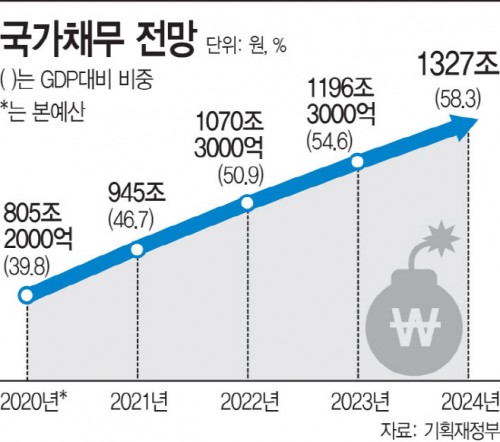 |
AsiaToday reporter Cho Sang-eun
South Korea’s government on Tuesday proposed a super budget for 2021 to overcome the COVID-19 crisis and to successfully launch Korean New Deal projects.
The budget bill of 555.8 trillion won (US$469.8 billion) was finalized at a Cabinet meeting presided over by Prime Minister Chung Sye-kyun at the Seoul Government Complex.
The budget proposal is aimed at pushing for Korean New Deal projects through aggressive spending to boost economic growth after the pandemic wanes.
“We will protect jobs and companies against the COVID-19 crisis,” the prime minister said. “We will achieve a strong economic recovery by boosting consumption and investment.”
The government’s massive budget proposal is an extension of this.
Among other things, the proposal is clearly aimed at pushing for Koran New Deal projects, where a total of 21.3 trillion won was earmarked.
Under the budget proposal, 8.6 trillion won will be earmarked to create or protect jobs, while 2.1 trillion won will be spent to enhance consumption vitality. Some 66 trillion won will be set aside for private and public investment, and 26 trillion won for social overhead capital.
A large part of spending is allocated to the health, welfare and labor sectors, where about 199.9 trillion won will be set aside. In particular, 30.6 trillion will be spent to create jobs. The requested budget is increased in most sectors next year, including national defense and agricultural sectors with 52.9 trillion won and 22.4 trillion won, respectively.
The government drafted a record 555.6 trillion won budget for next year in order to overcome the COVID-19 crisis; however the problem is that fiscal burden is increasing.
For example, the country’s sovereign debt is expected to increase 6.9 percent on-year to 945 trillion won next year, with its fiscal deficit reaching 5.4 percent of the gross domestic product and its debt to gross domestic product ratio increasing to 46.7 percent.
Besides, the government plans to issue some 90 trillion won worth of deficit-covering bonds to make up for the deficiency.
The government claims that the expansionary fiscal policy is inevitable despite the financial burden, since the ongoing epidemic crisis is the top priority.
“The financial health has deteriorated partly due to the expansionary fiscal policy,” Finance Minister Hong Nam-ki said. “Under the current wartime circumstances, we will faithfully fulfill the role required for finance while enduring some temporary debts and deficits,” Hong said.
#budget proposal #South Korea #COVID-19 #Korean New Deal
Copyright by Asiatoday
Most Read
-
1
-
2
-
3
-
4
-
5
-
6
-
7





















